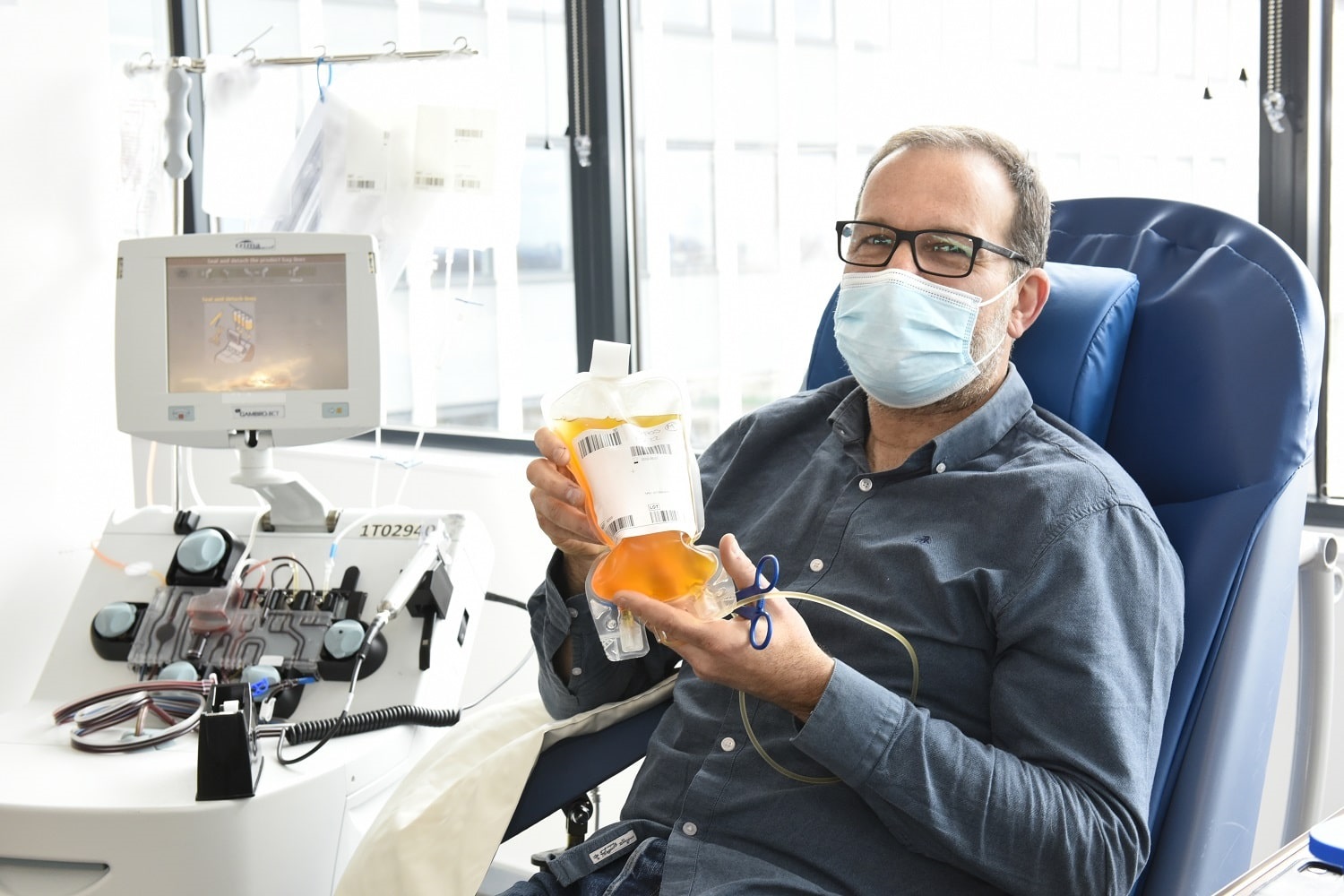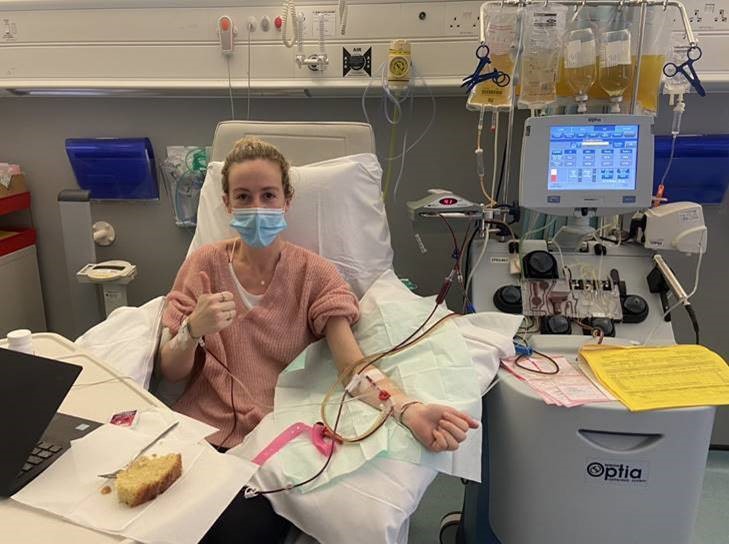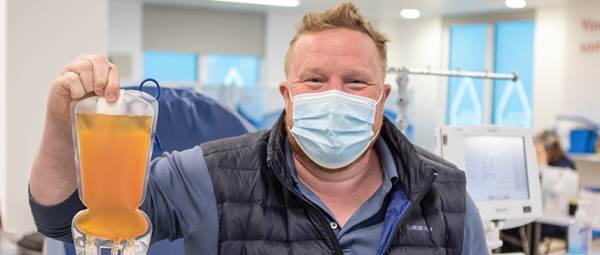First blood plasma for medicines donations begin
People will today (Wednesday April 7) donate blood plasma for medicines for the first time in more than 20 years.
The plasma will be fractionated and used to make antibody-based medicines – called immunoglobulins - for people with rare immune diseases.
NHS Blood and Transplant (NHSBT) will from today take donations at 14 donor centres around England, for an initial three months.
The donor centres are in Barnsley (closed from December 2021), Birmingham, Bolton, Bristol (converted to blood donation centre from November 2021), Chelmsford, Coventry (closed July 2021), Croydon, Manchester, Reading, Stockton, Stratford (converted to blood donation centre November 2021), Tottenham (closed from 23 June 2021), Twickenham and Wolverhampton (closed from 1 July 2021).
Thousands of patients rely on immunoglobulin medicines for short-term or lifelong diseases and genetic disorders. (1)
There is a global supply shortage due to rising demand (2). Up until now, the UK has depended on imports of blood plasma from other countries – mainly the US.
Donations to NHSBT will bolster the supply chain and improve the self-sufficiency of the UK in producing its own treatments.
These medicines are used to treat people with weak immune systems and a variety of other rare disorders. Illnesses include:
- immune disorders such as Common Variable Immune Deficiency
- neurological disorders such as Guillain–Barre syndrome and myasthenia gravis
- haematological disorders such as cytopenia - a low mature red blood cell count, which can occur following radiotherapy and chemotherapy for cancer treatment.
- dermatological disorders such as Kawasaki syndrome and toxic epidermal necrolysis
The restriction on using plasma from UK donors was introduced in 1998 as a precautionary measure against vCJD.
The restriction was lifted by the Department of Health and Social Care in February 2021, after the independent Commission on Human Medicines (CHM) advised it is safe and can recommence supported by a set of robust safety measures.
The Department of Health and Social Care has now directed NHSBT to start collecting plasma for medicines. The donations will be taken at repurposed former convalescent plasma donor centres, originally created for coronavirus research.
Plasma collected for medicines will be stored then supplied to one or more fractionators due to be appointed by NHS England later this year.
When people donate, the plasma is filtered out of circulating blood by an apheresis machine and the red blood cells are returned to the donor.
We are looking plasma donors. Find out more about donating blood plasma or call us on 0300 123 23 23.
Case study: how plasma helps
Charlotte Laycock needed intravenous immunoglobulin transfusions to help treat a rare long-term condition that causes muscle weakness.
The 31-year-old from Wimbledon was diagnosed with generalised Myasthenia Gravis in January 2021.
"As you can imagine, my life has been turned a little upside down since then," said Charlotte, an event manager.
Her immune system attacks the connections between her muscles and her nerve system.
She suffered muscle weakness, drooping muscles in her eye, lost the ability to speak and most seriously, could not even swallow food for a month.
"I couldn’t eat, I couldn’t talk," said Charlotte.
If her condition went untreated in the long term, she may even lose the ability to walk and need to use a wheelchair.
Charlotte had five days of immunoglobulin treatment at St George’s Hospital in March.
She said: "I’m largely symptom free now. I can lead a normal life. It means so much to me that people can now give their plasma."
Quotes
Dr Gail Miflin, Chief Medical Officer for NHS Blood and Transplant
"Plasma is made into lifesaving medicines for people with rare diseases. There is a growing need for plasma for medicines and a worldwide shortage of donors.
"Immunoglobulins are used as a treatment for people whose immune systems are not working properly, either because of a genetic disorder or as a result of treatment, usually for cancer or following transplantation. Immunoglobulins are also used in the treatment of neurological disorders such Guillain–Barre syndrome and myasthenia gravis.
"NHSBT already collects some plasma during whole blood donation but a dedicated plasmapheresis programme will greatly increase NHSBT’s ability to provide plasma at volume. This will play an important part in reducing the UK’s reliance on plasma donated in the US. Until the Government lifted a vCJD safety measure plasma these medicines could only be sourced from overseas.
"Like blood donation, plasma donation will be altruistic, for the benefit of the NHS. We’re asking people we contact to please donate plasma for medicines – you will save and transform lives."
Minister for Innovation Lord Bethell
"Today marks a historic occasion, with the first UK patients donating plasma to be used for lifesaving medicines in more than two decades.
"I am hugely grateful to the exceptional volunteers who will be donating today, as their contributions will eventually make a difference to the lives of so many.
"I urge all those thinking about donating plasma to absolutely take the plunge – by giving your time, you are ensuring more of these vital medicines can be provided to the patients who need them."
Sue Dimmock, Acting Chair of UK Primary Immune-deficiency Patient Support
"UKPIPS is delighted that UK-donated plasma can now be fully utilised for the benefit of UK patients, to manufacture lifesaving immunoglobulin medicines.
"Those of us who are unable to make our own antibodies completely rely on regular infusions of donated, plasma-derived antibodies (immunoglobulin) to fight infection and to stay as healthy as possible. Without this treatment, we have an extremely limited defence against infection and disease.
"For the last 20 years, plasma has been sourced from outside the UK. With the global demand for immunoglobulin products increasing each year, UK-donated plasma is great news for both security of supply and longer-term sustainability."
Dr Matthew Buckland, British Society for Immunology spokesperson and Consultant Immunologist at Great Ormond Street Hospital and Barts Health NHS Trusts
"Plasma products, such as immunoglobulins, are life-saving for patients with conditions that affect the functioning of their immune system. To make these therapies, we rely on the generosity of donors to provide a supply of plasma. There has been a recent increase in global demand for these products, so this new NHSBT programme to enable people in the UK to donate their plasma is hugely welcome."
“It will boost capacity to provide a more sustainable supply of these essential medicines, enabling patients to live their lives without worry about the availability of treatment."
Notes
- Around 17,000 people needed immunoglobulin therapy in 2018/19, receiving more than 5.5m doses, according to the 2018/19 National Immunoglobulin Database Annual Report.
- NHS England needs approximately 10% more immunoglobulins annually, according to the 2018/19 National Immunoglobulin Database Annual Report.
Media enquiries
For additional information please contact Stephen Bailey in the NHSBT press office on 07525 299 016 or stephen.bailey@nhsbt.nhs.uk
You can also contact the NHSBT press office on 01923 367 600 or pressoffice@nhsbt.nhs.uk
